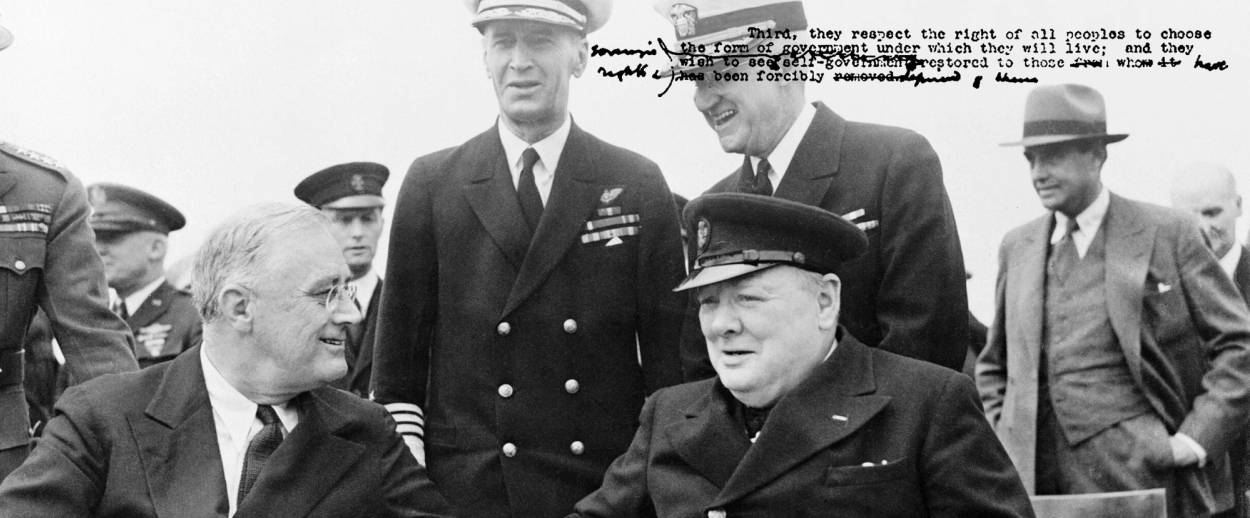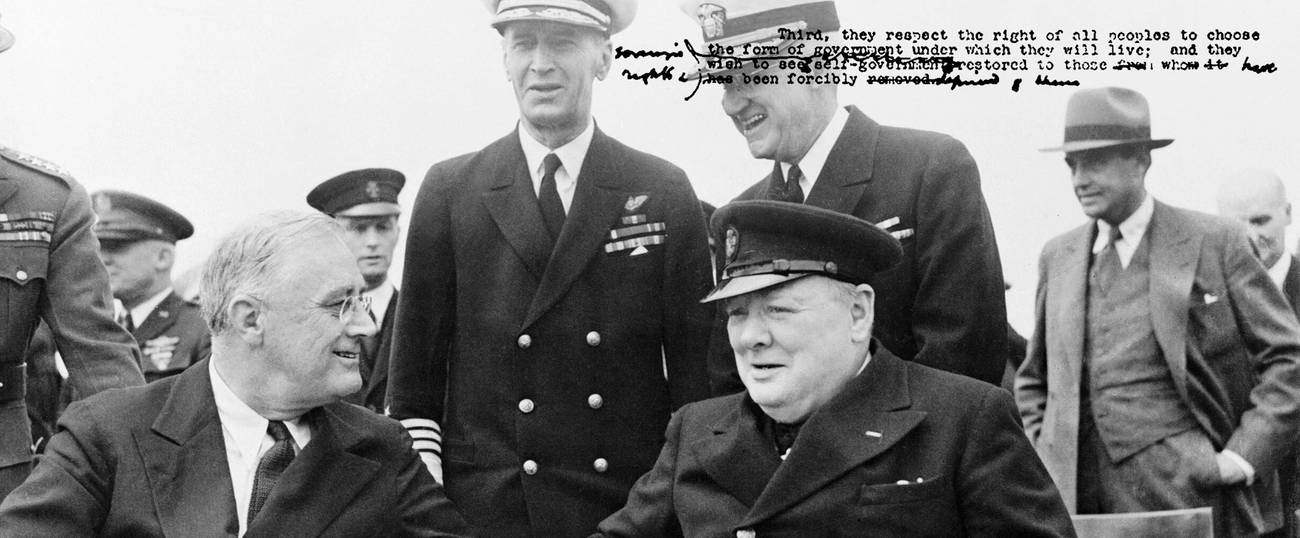The Shadow Election
2020, 1941, and the grand-scale rollback of a shared devotion to democratic freedom




The editors of Tablet magazine have invited me to beam a bright light of occasional political commentary on the election, and I have agreed to do so, except that, instead of beaming light, I intend to beam a shadow. An immense and tragic and glorious era in world affairs is coming to an end. Everyone sees it. Each of the political campaigns ought to be discussing it. But not everyone agrees on how to describe the era in question, or the meaning of its eclipse. And, in any case, speechlessness is the nearly universal reaction.
Michael Bloomberg conjured the origins of the era in his remarks in Norfolk, Virginia, last week, and this was useful of him. He recalled that, in the summer of 1941, at a moment when the world war was going worse than badly, Franklin D. Roosevelt met with Winston Churchill on a Navy vessel off the coast of Newfoundland. America was ostensibly neutral. Roosevelt and Churchill shared the expectation, however, that soon enough (in December of that same year, as it happened) America was going to assume its place among the combatants, and the American intervention was likely to shift the military balance. And Roosevelt and Churchill took the occasion to stipulate a point of principle.
This was the question of war goals, which they presented in the document that came to be known as the “Atlantic Charter.” Bloomberg, in his account of these events, has improved the charter a little by incorporating into it a speech that Roosevelt had made earlier in the year, spelling out the “Four Freedoms.” The Four Freedoms were freedom of speech, freedom of worship, freedom from want, and freedom from fear—and only two of those freedoms, the freedoms from want and fear, made their way into the charter. Still, the charter did establish that something called freedom was a goal. Bloomberg was accurate enough. And the stipulation of freedom amounted to a major event in world history.
It was also an American event, given that, from 1776 onward, freedom had traditionally been an American war goal—freedom in one version or another, including self-deluded versions. But America had not, in the past, been a world power, or else, as in World War I, had not known how to behave as one. Things were different by 1941. The United States did seem to command the ability to impose a military domination over large parts of the world, which suggested that it might also be capable, postwar, of kneading certain of those parts into shapes congenial to the traditional goal. Those were the hopes. The Atlantic Charter laid them out. The hopes amounted to a call for a new and revolutionary phase of world civilization, peaceful and in some degree liberal.
Even in 1941, a few efforts got underway to put together the proper institutions for the peaceful and liberal future, beginning with the creation of the United Nations, which revealed the universal scale of the aspiration. Too much naiveté went into the United Nations. But the next set of institutions, the postwar creations, were realistically designed. NATO, beginning in 1949, guaranteed the peace in Europe, and presaged a European political federation. The postwar economic accords and organizations were NATO’s ally in stabilizing the peace, and dug an additional foundation for a European federation. The economic organizations stabilized the boom-and-bust economic cycle, rendered international trade easier to pursue, and, in those ways, created the circumstances for the production of wealth.
The dismantling of the Western European empires in other parts of the world followed logically from the Atlantic Charter itself, which called for national self-determination (even if Churchill had never intended self-determination to mean the demise of the British Empire). Decolonization became politically feasible, too, once the European powers, having joined together in NATO, no longer needed to armor themselves against one another by maintaining colonies in faraway places. The decolonization occurred.
And waves of liberation flowed from those developments: the destruction of legalized racial hierarchies and the turn against racist ideas as a cultural tradition; the destruction of legalized gender hierarchies; the suspicion of cultural hierarchies in general; the democratization of culture. The liberating waves flowed, after a few decades, eastward in the direction of the Soviet Union, whose own inglorious empire collapsed; and to other parts of the world. The waves of liberation managed to seep even into the Arab and Muslim lands, if only in insufficient rivulets, accompanied by dreadful undertows.
And today the first signs of a grand-scale rollback—the first signs in 75 years—have become not just visible, but, with Brexit, official. From the World War until the end of January just now, the federal union of democratic Europe did nothing but grow. But Brexit means shrinkage, not just in economic matters. Churchill in 1946 called for a “United States of Europe,” but his own Tories have lately conveyed to the world that freedom, in its liberal and British version, ought to be seen henceforth as merely a small-scale idiosyncrasy of the British Isles (if that). The European Union will stumble along without the United Kingdom, but no one is going to remember that, barely a few years ago, the European Union appeared to be a giant lantern, illuminating how, in the future, the entire world ought to federate together, under a shared devotion to democratic freedom and wealth and the richness of cultural variety.
And the American rollback has likewise taken an official form. Until just now, it seemed conceivable, if only in principle, that high-minded leaders of the Republican Party would somehow recognize the folly of their error in 2016, and would seize on the chance for rectification. But the high-minded leaders, in their Senate deliberations, have decided otherwise. They have outdone the British Tories, too. Trump’s “America First” is, after all, a conscious resurrection of the anti-Roosevelt and anti-Atlanticist and anti-liberal slogan of the early 1940s—an “America First” that was directed against the very idea that altruistic devotion to democratic freedom at home and abroad ought to be America’s cause.
Or does anyone still suppose that Trump picks his slogans in blithe ignorance of their historical connotations? His canniness ought not to be in dispute by now. Besides, he and Bloomberg have one thing in common, which is to be products of a generation sufficiently antique to remember from early childhood the catchphrases of the ’40s. And if Bloomberg has taken the occasion to ruminate over the Four Freedoms and the Atlantic Charter, Trump has understood that, in inscribing “America First” into the political landscape, he has drawn a black line across the freedoms and the charter alike.
The cancellation of the Atlantic Charter was the meaning of the impeachment trial just now, given that Trump’s crimes and misdemeanors consisted principally of a conspiracy against the American solidarity policy. But somehow the trial did not lead to a sustained discussion of the deeper implications—the question of whether it was ever right for America to think of itself altruistically, as against the mercantile calculations of “First.” Rep. Adam Schiff alluded to these matters in one of his concluding perorations in the trial—Schiff, who, in my estimation, counts as the greatest of the American orators right now. But the end of an era in world history was not Schiff’s principal theme over the course of the impeachment, and neither was it anyone else’s. Nor do these developments figure within the electoral campaign, even if, at one moment or another, Bloomberg or somebody else might touch upon them, in puzzled or wistful tones.
No, what used to be huge—the notion of a brilliant destiny for democratic ideals in the world, promoted by the democratic countries—has faded away almost entirely. Today it has become embarrassing even to speak of such things. The political left, in its great mass, has sunk into a near-isolationism that calls itself idealistic, and the political right has sunk into a near-isolationism that calls itself anti-idealistic; and the sun has set. Shadow Inc. is the name of the Democratic Party’s app-developing service, and Shadow Inc. might as well be the name of the 2020 election—a crepuscular event, gloomy, lost in the murks of what can barely be remembered.
***
To read more of Paul Berman’s political and cultural criticism for Tablet, click here.
Paul Berman is Tablet’s critic-at-large. He is the author of A Tale of Two Utopias, Terror and Liberalism, Power and the Idealists, and The Flight of the Intellectuals.